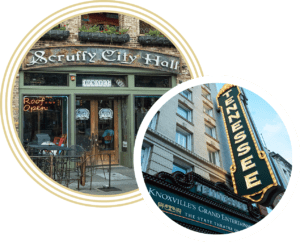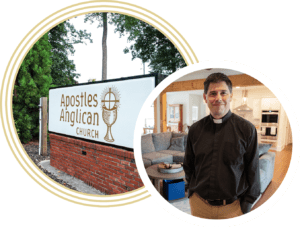“A scruffy little city on the Tennessee River.”

Eight years ago, as King was in his second year as Rector at Apostles Anglican Church (located in the Cedar Bluff neighborhood of Knoxville), he and his wife, Emily, were caring for younger children with a full calendar and asking, “How can we have good relationships with people beyond just Sunday morning? I guess because of the culture we grew up in, you had to put your best foot forward when guests came over. But maybe it’s got to be a lot simpler than that if we’re actually going to build friendships and build spiritual community around the table.” King decided to share what he was thinking in his blog, Knox Priest, and in the process found out what he really thought about hospitality.
“I remember my imagination really being captivated by the biblical word for hospitality, which is the Greek word ‘Philoxenia.’ It’s a compound word that means, ‘love of the stranger.’ And you actually kind of hear the word ‘zinnia’, like in the opposite form of that ‘xenophobia’ that’s the fear of the stranger. So, if I think about it Biblically, hospitality is the love of the stranger–the spirit of welcome.” King explained how there is a Southern expression, “Come put your feet under my table”, but that things change and are even better when you can say, “You can put your feet on the table.”

King is sitting on the front porch of his newly built house while sharing about these ponderings from eight years ago. Much thought was put into the architecture of the freshly built house to reinforce these ideas of hospitality so that guests would sense an open, welcoming flow when visiting. The reverberating effects of the article began to influence how he and the church shaped their ministry, and as he learned later, his ideas were beginning to get traction in unexpected places with people he did not even know.
For example, in 2019, writing on the website, Treehugger, boasting 2.6 million users, Robin Shreeves quotes Father Jack in her article, ‘In Praise of ‘Scruffy Hospitality’, “Scruffy hospitality means you hunger more for good conversation and serving a simple meal of what you have, not what you don’t have. Scruffy hospitality means you’re more interested in quality conversation than the impression your home or lawn makes. If we only share meals with friends when we’re excellent, we aren’t truly sharing life together.”
She goes on to write, “It’s more than okay to be scruffy. We can have the kind of open, welcoming home we long to have where authenticity shines, even if our kitchen floors do not.”
 King explains how as Anglicans, reverence is very important in the church but it doesn’t mean that you’re uptight; rather, his hope is that there is an authentic approachability which translates to welcoming people into your home and life. “It’s got to be more organic than something that is always planned. Life’s too busy. If everything is going to be where it’s got to be at a certain standard, it’s going to get longer and longer out to where you actually are face to face with people.” He explains that we give the invitation to the table to the baptized, which is how we should live into our faith, but we should be thinking about the other spaces where we can welcome people, like the family table, who have not been baptized. “There’s a sense of the liturgy after the liturgy too. And I think that family tables are a sense of like, okay, the liturgy on Sunday has ended, now there’s an opportunity for the liturgy of your table.”
King explains how as Anglicans, reverence is very important in the church but it doesn’t mean that you’re uptight; rather, his hope is that there is an authentic approachability which translates to welcoming people into your home and life. “It’s got to be more organic than something that is always planned. Life’s too busy. If everything is going to be where it’s got to be at a certain standard, it’s going to get longer and longer out to where you actually are face to face with people.” He explains that we give the invitation to the table to the baptized, which is how we should live into our faith, but we should be thinking about the other spaces where we can welcome people, like the family table, who have not been baptized. “There’s a sense of the liturgy after the liturgy too. And I think that family tables are a sense of like, okay, the liturgy on Sunday has ended, now there’s an opportunity for the liturgy of your table.”
King’s vision on hospitality has led the church to form Table Groups where each meeting will have two essential elements: a time of sharing food together and a time of prayer. Deacon Michelle Bickers, coordinator of events and hospitality at Apostles, says that “we’ve kind of misunderstood hospitality in our culture, that it is entertainment, but entertainment is really a different thing than hospitality.” She explains how one of the biggest hesitations to hosting Table Groups is that “people are worried about what their house looks like and so they really are hesitant to invite people in because maybe their kids threw a truck at the wall, and they had to go back and spackle over it. They’re afraid to have people come in and really see maybe the way they live because they envision everybody else living in a magazine.” Bickers has learned that “people don’t care what your house looks like, they really want to be welcomed and accepted in your house and they are not looking around to see if everything is perfectly dusted…God has invited us to his table; we’re seated alongside him. He doesn’t hover over us, he sits next to us…our job as believers is to really invite others to be at the table with us. That’s how we can love them and help them feel dignity and respect as we invite them into the church.”
Apostles Anglican even provides a Table Group handbook, “Mealtime Prayer Liturgy.” Included in it are suggestions like:
- Light a candle at the beginning of the meal saying, “Jesus is the light in a world of darkness.”
- Read the Phos Hilaron (O Gladsome Light)
- At the end of the meal, provide prompts for group discussion and/or prayer such as, “Where have you experienced the goodness of God today?”
- Read The Lord’s Prayer together
At the end of the discussion [interview?] on hospitality, King became animated as he shared an insight they gained while studying the ‘Gospel and the Christmas Carol’ a few years ago. “One of the things that you notice about the story that you can often miss is: how does Dickens end the novel? Scrooge is at the table. He begins estranged and he lives alone and it’s dark and cold. He goes through the visit of the three spirits. He has repentance. How does the novel end? He’s at a table with family on Christmas Day. It’s the sign of restoration. The restoration of friendship that this is how it ought to be. That’s how the story is going to end for us, right? The Marriage Supper of the Lamb. Every common meal has an eschatological sense. This is good, and there’s more coming.” One can easily see that as a church body embraces the invitational nature of scruffy hospitality, that this will be an ever-expanding foretaste of the great feast, filled with goodness, restoration, warmth, and friendship–at the table of Jesus, our Lord and King.
Watch the whole interview with Rev. Jack King here or listen to it on the podcast here. This video trailer will give you a brief taste of the interview.






